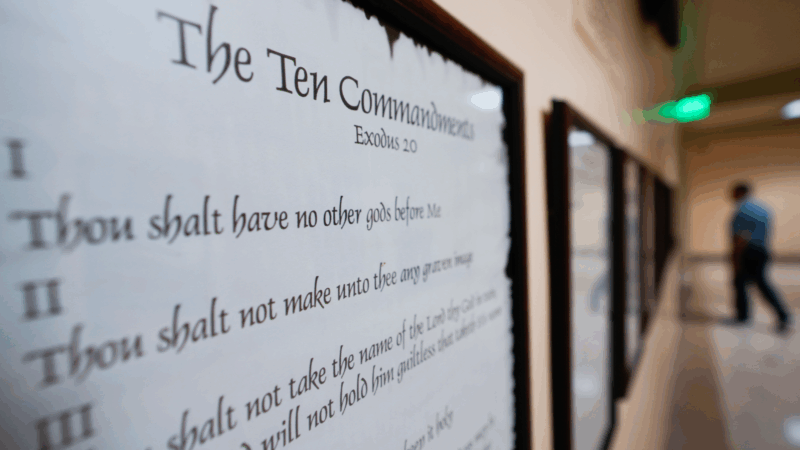The 2016 Alabama Legislative Session Begins Tuesday: Here’s What to Watch
The 2016 Alabama legislative session kicks off on Tuesday. From a lottery to tightening the state budget to teacher pay, this year’s session will be full of important and controversial issues. Don Dailey, host of Alabama Public Television’s Capitol Journal, explain what to expect this year.
The General Fund Budget
Lawmakers find themselves in the same quandary as 2015 when it comes to the state’s budget.
“We’ve already gone through some budget hearings and we’ve heard from a lot of key agency heads. They all ask for more money. They were all told that more money is not there,” says Dailey. “Now the question this year is what’s to be done.”
Lawmakers passed some modest tax increases during the 2015 session. The legislature also approved transfers of funds from the education budget to the general fund. But this year won’t be as easy.
“We’re told that those things are not going to be on the table this year,” Dailey says. “There’s no appetite for those sorts of things. I’m hearing from most lawmakers that belt-tightening is going to be the buzz phrase in the legislature this year.” Dailey says some are already asking how much more belt-tightening can be done.
Bold Ideas Return
Dailey says several “bold ideas” will be on the table this session, including calls to un-earmark revenue. Almost all of Alabama’s revenues are earmarked. For several years lawmakers have discussed freeing up money so it can be used on other things.
Legislators also say the 78/22 revenue split bill could also resurface.
“It’s actually a percentage split of revenue,” explains Dailey. “What Senator Paul Sanford (R-Huntsville) wants to do is put all of the state money in one pot and then split it 78 percent for education and 22 percent for the general fund.”
“That’s bold and lawmakers were a little apprehensive about it last year,” Dailey says. “It’s expected to be back on the table this year. We will see how far it gets.”
RAISE Act and Teacher Pay
A preliminary draft of a bill called the RAISE Act has been circulated in recent weeks, and it’s causing controversy in the education community.
“Senate President Pro Tem Del Marsh (R-Anniston) has been looking at legislation that would tie a teacher pay raise to some changes in the tenure system,” says Dailey. “That has raised some eyebrows within the education community, especially the proposal that teachers who were hired in 2017 or after wouldn’t be subject to the same tenure laws the current teachers are.”
“Teachers are obviously happy that a lot of attention is being paid to teacher pay raises this year but, by the same token, what are those raises tied to?” asks Dailey. He says teachers are concerned about any state law that would tie teacher pay raises to student performance.
“Teachers have a lot of questions about the measurements of that student performance,” says Dailey.
An Alabama State Lottery?
There are currently two bills prefiled relating to a state lottery.
“The first one out is a Republican-backed lottery plan by Senator Jim McClendon of Springville,” says Dailey. “It’s a very simple proposal: a constitutional amendment that would put to a vote whether or not the people of Alabama want a lottery. If they say ‘yes’ the legislature would come back and construct that lottery.” That plan has raised criticism, especially among Democrats.
“House minority leader Craig Ford (D-Gadsden) has gone so far as to say that he feels the legislation is designed to kill the lottery idea altogether,” Dailey says. “He doesn’t think Alabamians will vote for lottery if they don’t know where the revenues are going to go.” Ford has filed his own lottery bill. It’s the seventh year in a row he’s sponsored lottery legislation. Ford wants the proceeds from a state lottery to go to college scholarships.
The Tensions of 2015 are Back
The 2015 legislative session was marked by infighting between Republicans and clashes between Republicans and Governor Robert Bentley. This year should be no different.
“The talk in the hall in the Statehouse leading up to the regular session has been that some of the same divisions still exist, especially within the Republican Party,” says Dailey. “A lot of political observers are going to be watching that very closely.”
Divisions are strongest over the leadership of House Speaker Mike Hubbard (R-Auburn).
Hubbard’s Trial and the Legislative Session
Hubbard is scheduled to stand trial for 23 felony ethics charges on March 28. He’s accused of using his public positions for personal financial gain. Earlier this month, the Alabama Republican Party Steering Committee passed a resolution requesting Hubbard suspend his role as speaker.
“Hubbard has been very steadfast in saying that he has no intention of stepping down and he thinks the calls for him to step down as speaker are purely political in nature,” Dailey says. If Hubbard’s trial proceeds as planned, it will be during the legislative session, which will probably run until mid-May. He’s announced no plans concerning who would lead the house during that time.
US military airlifts small reactor as Trump pushes to quickly deploy nuclear power
The Pentagon and the Energy Department have airlifted a small nuclear reactor from California to Utah, demonstrating what they say is potential for the U.S. to quickly deploy nuclear power for military and civilian use.
How Nazgul the wolfdog made his run for Winter Olympic glory in Italy
Nazgul isn't talking, but his owners come clean about how he got loose, got famous, and how they feel now
Court clears way for Louisiana law requiring Ten Commandments in classrooms to take effect
The 5th U.S. Circuit Court of Appeals has cleared the way for a Louisiana law requiring displays of the Ten Commandments in public classrooms to take effect.
From cubicles to kitchens: How empty offices are becoming homes
Many U.S. cities have too many office buildings and not enough homes. Developers are now converting some old offices into apartments and condos, but it's going slowly.
Opinion: The enduring dignity of Jesse Jackson
Rev. Jesse Jackson died this week at age 84. NPR's Scott Simon remembers covering Jackson's 1984 presidential campaign in Mississippi.
A huge study finds a link between cannabis use in teens and psychosis later
Researchers followed more than 400,000 teens until they were adults. It found that those who used marijuana were more likely to develop serious mental illness, as well as depression and anxiety.





